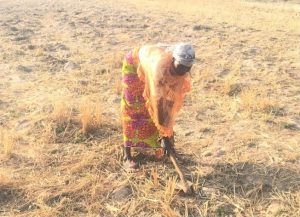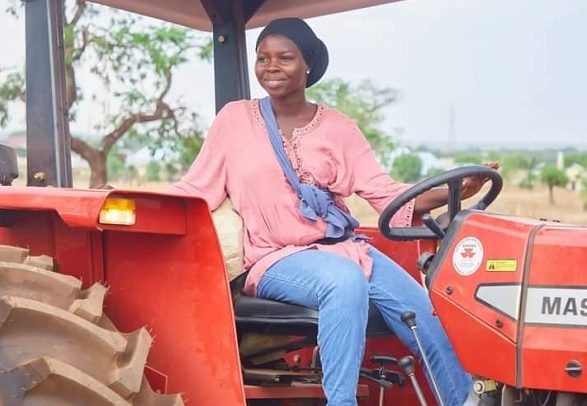Ms Kadri Hikimatu , licensed tractor operator
It has been a battle of norms for 45-year-old Saana Mashud at Pagazaa, a farming community in the Northern region. This is because male farmers are put above female farmers in her community.
“The men always tell us that they feed the family and so they have to plow their farms first,” she told DGN Online in an exclusive interview.
According to reports, gender inequalities exist in agriculture particularly in Ghana and Africa at large, and Saana believes this has led to women like her to stay at the bottom of the chart in agricultural production.
“Sometimes you can even be holding the money waiting for tractors to plow your farm, and you can wait in vain. if there is fair access then I believe most of us would have been better off than we are.”
Women form almost 50 per cent of the agricultural workforce in developing countries. Despite their strong involvement in farming, research says women-run farms produce 20-30 per cent lesser yields than male-run farms.
The Food and Agriculture Organization (FAO) maintains that this disparity is directly linked to gender-specific challenges such as access to mechanization services, land, and a clear lack of policy on inputs distribution.
Saana says as a norm she and other women must first pay attention to their husbands’ fields before they can attend to their fields.

Madam Saana Mashud preparing her land for the farming season
Land accessibility in most African countries is still a major problem. Access is granted by men and most of the time such lands given to women are not fertile. However, in Ghana, women are yet to overcome the challenges of tractor services which is said to be hindering their efforts to own large farm fields.
Women leaders finds this to be a worrying trend and demand fair access, as Ghana deals with insufficient number of tractors which are often operated by men.
While this situation prevails in conservative farming communities across Northern Ghana, one woman is bringing a paradigm shift in the sector.
Kadri Hikimatu, is a licensed tractor operator who feels it is time to break the male dominance in the field of tractor operations.
“ Out of 10 women farmers I can say that only 2 get access to tractor services during the farming season as well as they are always being served last after their male counterparts and so that’s why I decided to venture into tractor services for women.”
With her working gear, Hikimatu readied to turn the soil over with the tractor she has become accustomed to over the years at the Tibzaa farms, near the northern capital Tamale when DGN Online visited her.
She shares working space with the Tibzaa farms where it all started.
“Growing up I wanted to be a nurse but after my senior high school the vision changed when I started working at Tibzaa farms as a poultry attendant and the tractor service passion started when Tibzaa started crop production when I was made the farm manager of the company and we were using machines in our land preparations and so I decided to learn the basics of farm machinery such as tractor operating.”
Now Hikimatu is keeping her eye on the goal. She wants to even do more to support women with the ‘Baby’ steps Agromart Solutions Limited company she has just started.
“I have trained over 30 females in tractor operation and some have gained employment through my training and are earning incomes to support themselves and their families.”
But this achievement did not come on a silva plater for Hikimatu as she had to face stigmatization by society.
“Those that I work with I made them to understand that even though we have come into the field we are not here to compete with them but rather complement their efforts.”
Hikimatu’s skills go beyond the ability to plow, she can as well carry maintenance when a tractor breaks down.
“Before we go onto the field I normally change the oil, change the filters and check engine as well to ensure that we are ready to work for the day.”
Women’s rights promoter, the Executive Director of Songtaba , Madam Lamnatu Adam agrees with Saana Mashud that women’s right should be respected in agriculture.
“Women should be given opportunity to get access to fertile lands and mechanization services to farm in order to make income and feed their families.”
Women’s rights are linked to their livelihood according to the Executive Director of Songtaba, Madam Lamnatu Adam, and wants the government to pay attention to the women farmers who form a larger part of the farm labor in Ghana.
“Unfortunately, they are involved in crops that do not fetch them much income as expected due to the lack of support such as lack of access to fertile lands, tractor services and other productive resources.”

Whilst efforts are made to rope in more women into agriculture with incentives such as allocating awards for best women farmers, training of women to adopt best agriculture practices, women still face limitations on the fields.
Hajia Hawa Musah, Northern Regional Director of Agriculture, in an interview with DGN Online tacitly admits that women are at the disadvantage due to the limited number of tractors available.
She, however, bemoaned that lands are held in trust by chiefs and sometimes family heads which is a challenge for the progression of women in Agriculture.
“It’s assumed that food will be produce for the woman to cook at home. Women rely on their husbands or their brothers to acquire lands which is not sustainable because she may work on the land and the following year a family member might come for it in the next farming season.”
The Northern Regional Director of Agriculture wants chiefs and opinion leaders to give women accessible lands closer to them so that they do not walk long distances to access their farmlands.
“About 40% of government projects in Agriculture has been allocated to women to support women in the sector.”
Back to the Pagazaa community, Saana cracks groundnut with the support of her three children, she thinks agricultural norms impacts women negatively.
“Its time to fight the discrimination, its time to stop the injustice in farming, we need to stop this because its making a lot of women poor.”
For Saana Mashud, Hikimatu’s efforts to make access cheap for women in agriculture are commendable, and hope that one day the government will consider a policy to address the gaps in the agriculture sector for women farmers.
FROM Eric Kombat, Tamale

